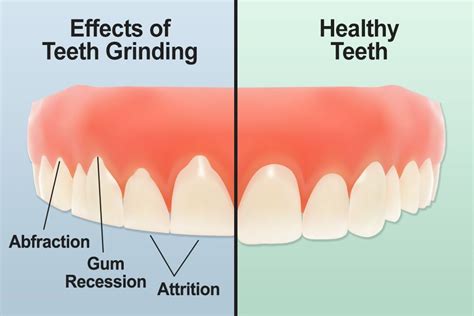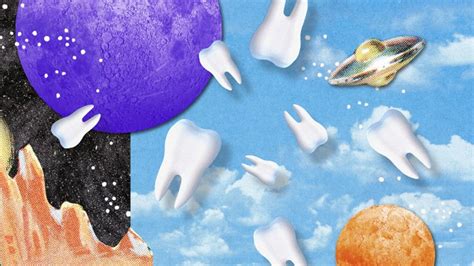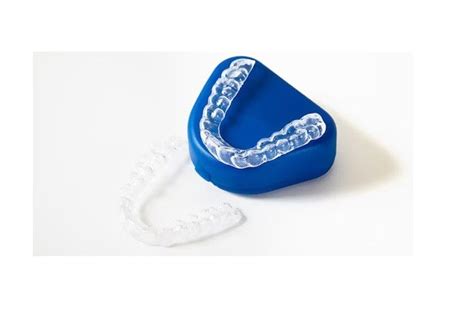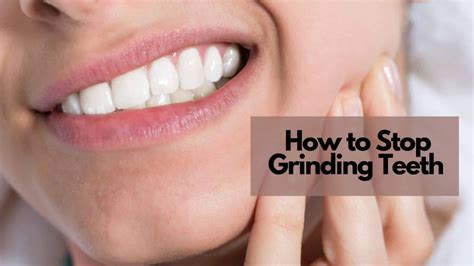Have you ever experienced nocturnal episodes filled with inexplicable discomfort and unnerving sensations? If so, you are not alone in your nocturnal perplexities. Countless individuals find themselves trapped in a puzzling realm where their teeth undergo unrelenting pressure and even fracture while they sleep. This enigmatic occurrence, often shrouded in darkness, defies easy explanation.
Imagine a restless slumber, where a relentless force grinds against your precious dental enamel. The very foundation of your oral health is at stake, as your teeth are subjected to the strain of unseen tensions. A haunting symphony of sounds reverberates through the depths of your dreams, hinting at the profound significance of this nocturnal ailment that plagues so many. It is an elusive condition that transcends the realms of conscious control, a phenomenon begging to be understood.
As the morning light casts its gentle glow, you awaken with a sense of unease, unsure of the events that unfolded within your subconscious. With each passing night, the mystery persists, leaving you troubled and searching for answers. Fret not, for our quest for knowledge knows no bounds. Through a journey of exploration and analysis, we delve into the roots, consequences, and potential remedies of this perplexing condition. Let us embark on a quest to unravel the enigmatic world of nocturnal teeth grinding and fracturing.
The Physical Causes of Tooth Grinding

Teeth grinding, also known as bruxism, can be caused by various physical factors that contribute to this unconscious grinding and clenching of the teeth. Understanding these factors can shed light on the underlying causes and help identify potential solutions for this common dental issue.
1. Dental Misalignment: Misalignment of teeth can be a physical cause of tooth grinding. When the upper and lower teeth do not fit together properly, it can lead to an uneven distribution of chewing forces, causing the jaw muscles to overcompensate and result in grinding.
2. Stress and Anxiety: Emotional and psychological factors can manifest physically as tooth grinding. Stress and anxiety can cause tensed jaw muscles, leading to clenching and grinding of the teeth during sleep or even while awake.
3. Medications: Certain medications, such as some antidepressants or stimulants, can have side effects that include tooth grinding. These medications can affect the central nervous system and increase muscle activity, contributing to grinding sensation during sleep or wakefulness.
4. Sleep Disorders: Certain sleep disorders like sleep apnea or snoring, which result in breathing difficulties during sleep, can also lead to tooth grinding. The body's instinctive response to maintain an open airway may trigger grinding and clenching as a means of opening the jaw and facilitating breathing.
5. Temporomandibular Joint (TMJ) Disorders: TMJ disorders, which affect the jaw joint and surrounding muscles, can be another physical cause of teeth grinding. Any imbalance or dysfunction in this joint can result in muscle tension and jaw movements that lead to grinding.
6. Lifestyle Factors: Certain lifestyle habits, such as excessive alcohol consumption, smoking, or the use of recreational drugs, can increase the risk of teeth grinding. These substances can alter the nervous system's regulation of muscle activity and contribute to grinding tendencies.
Understanding the physical causes of tooth grinding is crucial in developing effective solutions and treatment approaches. By addressing these underlying factors, individuals can take proactive steps towards preventing or reducing the occurrence of tooth grinding and its potential negative impacts on dental health.
The Psychological Elements Behind Teeth Clenching and Fracturing
Within the realm of dreams and unconscious associations lies a multitude of intricate psychological factors that contribute to the occurrence of teeth grinding and fracturing. Understanding these underlying elements is crucial in the search for effective solutions and preventative measures.
1. Emotional Stress: Psychological tensions and anxieties can manifest themselves in various forms, including bruxism - the involuntary grinding of teeth. Emotional burden, whether due to personal relationships, work-related pressures, or unresolved conflicts, can significantly impact a person's oral behaviors.
2. Unconscious Coping Mechanisms: The subconscious mind often resorts to habits such as teeth grinding as a means to deal with unresolved issues or emotional pain. It is essential to recognize and address these underlying emotional traumas to achieve lasting relief from bruxism.
3. Personality Traits: Certain personality traits, such as perfectionism, self-criticism, and aggression, have been associated with bruxism. The tendency to internalize stress and exhibit high levels of self-demand can inadvertently lead to teeth clenching and fracturing during sleep.
4. Sleep Disorders: Bruxism has also been linked to various sleep disorders, including sleep apnea and restless leg syndrome. The disruption of normal sleep patterns and underlying physiological factors can contribute to the occurrence of teeth grinding.
5. Traumatic Experiences: Past traumatic experiences, especially those associated with the face, mouth, or dental procedures, can leave lasting imprints on the unconscious mind. Teeth grinding may serve as a manifestation of the psychological impact of these traumas.
- Emotional Stress
- Unconscious Coping Mechanisms
- Personality Traits
- Sleep Disorders
- Traumatic Experiences
By acknowledging and exploring these psychological factors, individuals suffering from teeth grinding and fracturing can gain valuable insights into the root causes of their condition. This understanding paves the way for targeted therapies, stress management techniques, and psychological interventions to alleviate the burden and restore oral health.
Discovering the Symbolic Significance of Teeth Grinding Dreams

Exploring the symbolic meaning behind dreams of teeth grinding offers a unique opportunity to gain insight into and interpret the hidden messages from our subconscious mind. These dreams, characterized by the clenching and grinding of teeth, delve into the intricate realms of our psyche, representing deeper emotions, anxieties, and life challenges.
- Unveiling Unresolved Tension: Teeth grinding dreams can be symbolic of unresolved tension and suppressed emotions that are gnawing away at our mental and emotional well-being. These dreams serve as a profound invitation to explore and address the underlying issues causing this tension in our waking lives.
- An Indication of Stress and Anxiety: In the realm of dreams, teeth grinding may serve as an allegorical representation of stress and anxiety plaguing us during wakefulness. These dreams act as a warning sign, urging us to identify and alleviate the sources of our stress to restore balance and harmony in our lives.
- Symbolic of Communication Challenges: Teeth grinding dreams can also symbolize difficulties in communication. Just as teeth are essential for clear speech, dreams of grinding teeth may reflect our struggle to express ourselves effectively or the fear of being misunderstood.
- Reflecting Fears and Insecurities: Dreams featuring teeth grinding often mirror our deepest fears and insecurities. They may represent our apprehensions about our physical appearance, fear of loss, or uncertainty about the future. Exploring these fears is crucial to attain personal growth and self-acceptance.
- Encouraging Self-Reflection: These dreams act as mirrors, urging us to engage in introspection and self-reflection. They implore us to delve deeper into our own psyche and confront the unconscious issues that may be hindering our progress and well-being.
In conclusion, exploring the symbolic meaning behind teeth grinding dreams opens up a gateway to self-discovery and personal growth. By analyzing these dreams and recognizing the hidden messages they hold, we become better equipped to address the underlying challenges and fears that may be impeding our journey towards a fulfilling and harmonious life.
Exploring the Meanings of Teeth Shattering Dreams
Within the realm of our unconscious minds, there lie mysterious visions that can leave us both bewildered and intrigued. One such enigmatic experience involves dreams of our teeth shattering, a phenomenon that often elicits deep emotions and perplexing thoughts. In this section, we delve into the various interpretations of these dreams, seeking to unravel their hidden messages and symbolic significance.
These nocturnal visions of teeth shattering can be seen as a metaphorical exploration of our inner strength and resilience. The act of teeth breaking symbolizes the fragility of our core beliefs and values, and the challenges and pressures we encounter in our waking lives. These dreams may serve as a reminder to reassess our own inner foundations, to identify any weak points and work towards fortifying them.
Another possible interpretation of teeth shattering dreams relates to the fear of losing control. When our teeth crumble and fall apart, we may feel a loss of power and a sense of vulnerability. These dreams may reflect our apprehensions about being unable to maintain our composure or handle stressful situations in our waking lives. They urge us to confront and overcome these fears, to embrace change, and to find ways to regain a sense of control.
Furthermore, dreams of teeth breaking may speak to our anxieties surrounding our appearance and how we are perceived by others. As teeth are associated with beauty and attractiveness, this type of dream can evoke feelings of self-consciousness or a fear of aging. It may be a reminder to nurture our self-esteem and self-image, to embrace our unique imperfections, and to focus on the qualities that make us truly remarkable.
In conclusion, dreams of teeth shattering are rich in symbolic meaning and can provide insightful glimpses into our subconscious. By exploring these interpretations, we can gain a deeper understanding of ourselves and the challenges we face. Embracing the messages conveyed in these dreams can empower us to confront our fears, build resilience, and cultivate a more confident and authentic self.
Effective Solutions for Teeth Clenching and Jaw Tension

Dealing with the issue of teeth grinding and jaw clenching can be a challenging task, but there are effective solutions available to alleviate the discomfort and address the underlying causes. By implementing these strategies, individuals can regain control over their oral health and reduce the negative impact of these habits on their teeth and overall well-being.
1. Stress Management: One of the primary causes of teeth clenching and jaw tension is stress. Developing effective stress management techniques, such as practicing meditation, engaging in regular exercise, or seeking professional therapy, can significantly reduce the likelihood of teeth grinding during sleep or periods of stress.
2. Mouthguards and Splints: Wearing a custom-made mouthguard or splint can prove to be an effective solution for preventing the damage caused by teeth clenching and grinding. These devices act as a protective barrier between the upper and lower teeth, minimizing the impact and reducing muscle tension.
3. Relaxation Techniques: Engaging in relaxation techniques before bedtime can help relax the muscles in the jaw and minimize teeth grinding during sleep. Techniques such as deep breathing exercises, warm baths, or listening to soothing music can promote relaxation and reduce the likelihood of nighttime teeth grinding events.
4. Avoid Stimulants: Certain substances such as caffeine, alcohol, and nicotine can contribute to teeth clenching and grinding. Limiting the consumption of these stimulants, especially in the evening, can help reduce the frequency and intensity of these habits.
5. Dental Correction: In some cases, misaligned teeth or an improper bite may be contributing to teeth grinding and jaw clenching. Seeking dental correction through orthodontic treatments or dental appliances can help address these underlying issues and provide long-term relief.
6. Regular Dental Check-ups: Regular dental check-ups play a crucial role in identifying and addressing any dental problems associated with teeth grinding and jaw clenching. Dentists can provide personalized advice, treatment options, and monitor the progress of any ongoing treatments.
By implementing these effective solutions, individuals can take control of their oral health, reduce the discomfort caused by teeth clenching and jaw tension, and prevent further damage to their teeth and overall wellbeing.
Addressing Emotional and Psychological Triggers of Tooth Wear
In this section, we explore the underlying emotional and psychological factors that can contribute to tooth wear, a common issue experienced by many individuals. By addressing these triggers, it is possible to gain insight into the root causes and work towards effective solutions to alleviate the problem.
Understanding the Influence of Emotions
Emotions play a significant role in our daily lives and can have a direct impact on our dental health. Stress, anxiety, anger, and other negative emotions can manifest themselves through physical symptoms, including grinding and clenching of the teeth. These intense emotions may be associated with various aspects of our personal and professional lives, and recognizing their influence is key to addressing tooth wear.
The Connection between Psychological Factors and Tooth Grinding
Psychological factors such as personality traits, psychological disorders, and unresolved emotional issues can contribute to teeth grinding. Individuals who are perfectionists, highly self-critical, or prone to high levels of anxiety may be more susceptible to this condition. Additionally, unresolved trauma or emotional distress can manifest itself through dental problems, highlighting the importance of addressing the psychological aspects to find lasting solutions.
Exploring Coping Mechanisms and Therapeutic Approaches
When it comes to addressing the emotional and psychological triggers of tooth grinding, various coping mechanisms and therapeutic approaches can prove beneficial. Stress reduction techniques, such as mindfulness meditation, deep breathing exercises, and yoga, can help manage stress levels and improve overall well-being. Seeking professional support through therapy or counseling can also provide valuable insights and strategies to address underlying emotional issues.
Adopting a Holistic Approach to Dental Care
Embracing a holistic approach to dental care involves recognizing the interconnection between physical, emotional, and psychological well-being. By focusing on overall wellness and maintaining a healthy lifestyle, individuals can reduce the impact of emotional triggers on their dental health. This may include practices such as regular exercise, proper nutrition, and engaging in activities that promote relaxation and stress reduction.
In conclusion, addressing the emotional and psychological triggers of tooth grinding is essential to finding lasting solutions for tooth wear. By recognizing the influence of emotions, understanding the connection between psychological factors and tooth grinding, exploring coping mechanisms and therapeutic approaches, and adopting a holistic approach to dental care, individuals can take proactive steps towards improving their dental health and overall well-being.
Protective Measures for Safeguarding Teeth from Grinding and Fracturing in Dreams

In this section, we will explore various preventive strategies that can be employed to ensure the preservation of teeth integrity during dream experiences involving tooth grinding and fractures. By adopting proactive measures, individuals can reduce the potential consequences associated with these nocturnal events.
Maintain a stress-free lifestyle
Stress is often considered a primary contributor to teeth-related dreams. By implementing stress-management techniques such as meditation, yoga, or engaging in hobbies that promote relaxation, individuals can minimize the likelihood of experiencing dreams involving tooth grinding and breaking.
Practice good oral hygiene
Regular brushing, flossing, and using mouthwash can significantly contribute to overall oral health. Adopting a consistent oral hygiene routine helps in preventing dental issues and, consequently, reduces the chances of encountering teeth-related dreams.
Limit or avoid consumption of teeth-damaging substances
Various substances, such as caffeine, nicotine, and alcohol, can contribute to teeth grinding and weakening. The ingestion of these substances should be limited or avoided altogether, particularly close to bedtime, to mitigate the occurrence of dreams involving the grinding and breaking of teeth.
Use a mouthguard
To protect teeth from grinding and potential fracture during sleep, a custom-fitted mouthguard can be used. This dental appliance acts as a cushion and serves as a barrier to minimize the impact generated by teeth grinding, successfully reducing the likelihood of experiencing tooth-related dreams.
Ensure regular dental check-ups
Regular dental visits are essential for detecting and addressing any potential dental issues early on. Through routine check-ups, dentists can identify signs of teeth grinding or weakened teeth, subsequently providing necessary treatments and guidance, which can effectively decrease the occurrence of related dreams.
Improve sleep quality
Poor sleep quality is often cited as a significant factor contributing to teeth-related dreams. By adopting healthy sleep practices, such as establishing a regular sleep schedule, creating a comfortable sleep environment, and practicing relaxation techniques before bed, individuals can promote better sleep, subsequently reducing the likelihood of experiencing dreams involving tooth grinding and breaking.
Incorporating these preventive measures into daily routines can help safeguard teeth from grinding and breaking during dreams, ensuring overall oral health and promoting more peaceful sleep experiences.
FAQ
Why do people grind their teeth during sleep?
Teeth grinding during sleep, also known as bruxism, can be caused by various factors such as stress, anxiety, misaligned teeth, or sleep disorders. It is a subconscious behavior that can lead to dental problems and should be addressed.
Is teeth grinding a serious problem?
Teeth grinding can lead to serious dental issues such as tooth fractures, enamel erosion, and TMJ disorders. If left untreated, it can cause significant damage to the teeth and oral health. Therefore, it is important to seek professional help if you are experiencing teeth grinding.
What are the potential interpretations of dreams about grinding and breaking teeth?
Dreams of grinding and breaking teeth can have different interpretations depending on the context and personal experiences. Some widely accepted interpretations suggest that these dreams may be related to feelings of insecurity, powerlessness, or anxiety about losing control. It is important to remember that dream interpretations can vary for individuals.
Are there any solutions to stop teeth grinding?
Yes, there are several solutions to stop teeth grinding. Some common approaches include stress reduction techniques, wearing a mouthguard at night, practicing good sleep hygiene, and seeking professional help for underlying dental or sleep issues. It is recommended to consult a dentist or a healthcare professional for proper diagnosis and treatment.



